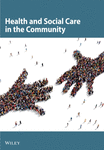Welfare agencies and risk: the missing link?
Abstract
This paper is based on research into risk and social welfare being conducted at the University of Hull, funded by the Economic and Social Research Council (1.10.94–30.9.96) as part of the Risk and Human Behaviour Programme. The research project focuses on the issues of risk affecting the social welfare of adults with learning disabilities and vulnerable children. The role of agencies has been relatively neglected in discussions of risk assessment and risk management concerning vulnerable clients in the community. This paper examines how and why risk influences the nature and operations of welfare agencies. Using data collected from a sample of welfare agencies providing care and support for either vulnerable children or adults with a learning disability, we examine how agencies respond to and manage risk. Although the documents provided by the majority of welfare agencies indicated recognition of risk, in only a minority of agencies was this recognition translated into explicit risk policy and practice.




